World Obesity HLM4 Toolkit
For half of humanity: four billion reasons we need action on obesity
What is our campaign?
We have developed a campaign that is building on existing work to influence policy-makers and industry opinion around obesity. The overarching aim of this campaign is to ensure that obesity is recognised as a disease at the root of other non-communicable diseases, requiring multisectoral action including in primary health care.
The campaign has both short and medium term objectives. In the short-term we are looking to influence the outcomes of the High Level Meeting on Non-Communicable Diseases in September 2025. In the medium-long term, the campaign will then run across the subsequent two-years aiming to build momentum towards HLM on UHC in 2027.
Why does it matter?
We need to shine the spotlight on obesity as the defining global health equity crisis of the 21st century.
Obesity currently affects over 1 billion people and, without action, we will leave half the world behind - 4 billion people will be affected by overweight and obesity by 2035. Obesity is a universal and urgent issue, but remains politically neglected - misunderstood as personal failure rather than structural injustice. We need urgent collective action from policymakers, healthcare providers, media and the public.
We need to bring together influential, diverse global voices to reframe obesity as a complex, systemic health challenge - including prevention, equitable treatment, and care - highlighting intersections of culture, science, policy, and lived experience. The upcoming High Level Meeting on Non-Communicable Diseases in NY in September 2025 is our critical moment to act.
How can you get involved?
- Use the key messages, proof points and calls to action to start conversations around the campaign and mobilise allies
- Support online by sharing social media assets (coming very soon)
- Engage with influencers to amplify the campaign messaging
- Engage policymakers by sharing the Political Declaration asks
- Get in touch! Write to us if you’d like us to support your efforts advocacy@worldobesity.org.
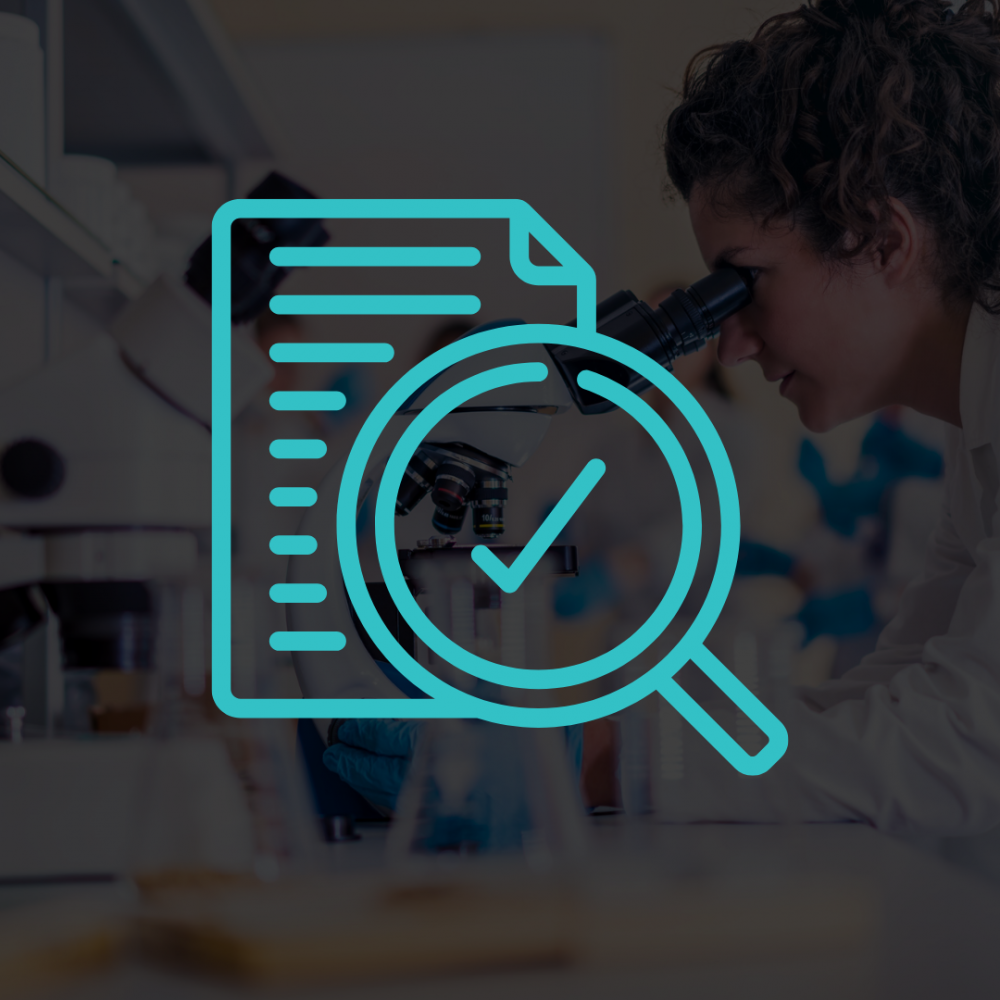
Proof points
The data reveals the vast impact of obesity and overweight, hiding in plain sight:
- There are currently over 1 billion people in the world with obesity and almost two billion with overweight (in total, almost 3 billion people)
- Obesity rates have more than doubled since 1990 for adults, and more than quadrupled for children and adolescents
- Without action, 4 billion people will be affected by overweight and obesity within the next decade - the vast majority in low and middle income countries.
- This rise will lead to huge increases in other non-communicable diseases too. Obesity already contributes to:
- 43% of type two diabetes cases
- up to 78% of hypertension cases
- over 13 cancer types
Put simply, if we manage obesity now, we save lives from these diseases later on.
- People living with obesity also have worse health outcomes across a range of other conditions including HIV, COVID and kidney disease as well as maternal and neonatal health.
- Taken together, World Obesity Federation analysis predicts that the global economic cost of overweight and obesity will reach nearly 3% of GDP by 2030 if prevention and treatment measures do not improve.
While these facts should shock you; they should inspire action - not fatalism. Increasingly, we know what’s needed to prevent and manage obesity and overweight.
Actions like the WHO ‘Best Buys’ for NCDs are proven and cost-effective policies that support enabling environments for obesity prevention and management through healthy diets and physical activity. They also benefit outcomes on wider health issues while reaping wider social and environmental dividends too.
We need to accelerate our global response to the obesity epidemic by strengthening health systems to ensure early diagnosis, timely intervention, and access to the full continuum of evidence-based treatment options—including behavioral, medical, and surgical modalities—alongside the management of associated comorbidities.
For the treatment of obesity, new pharmacological therapies are reducing the risk of T2 diabetes and its complications, cardiovascular disease, and liver cancer, among other conditions. WHO is set to include these obesity medications in the updated Essential Medicines List - recommended for all countries to make available to their populations.To ensure lasting impact, these innovations must be embedded within comprehensive, scalable, and sustainable health system strategies that promote universal, equitable access to prevention, treatment, and long-term management of obesity and related noncommunicable diseases.
Read More
Key messages
- Obesity affects over 1 billion people at present - contributing to almost 4 million deaths annually and driving 43% of diabetes cases, up to 78% of hypertension, and 13+ cancer types
- Without action, we're leaving half the world behind - 4 billion people will be affected by overweight and obesity by 2035, with economic costs reaching nearly 3% of global GDP by 2030
- We have proven solutions that deliver a "double dividend" - WHO 'Best Buys' policies and new pharmacological treatments (soon to be on WHO's Essential Medicines List) can generate health and economic gains while targeting the root cause of multiple diseases
- The High Level Meeting on NCDs is our critical moment to act - the Political Declaration must recognise obesity as a disease, commit to multisectoral WHO recommendations, and accelerate action with people with lived experience at the center
- Success requires shifting from individual willpower to collective political will - integrating obesity care into primary healthcare, reducing ultra-processed foods, and implementing the WHO Acceleration Plan through whole-of-society approaches

Assets
This section houses all downloadable assets for the For Half of Humanity campaign - including social media graphics, and flyers. These tools are designed to help advocates, partners and allies amplify our shared calls for action on obesity in the lead-up to the 2025 UN High-Level Meeting on NCDs.
Use them to support your own communications, activate your networks, and help make the case that now is the time for urgent, united action on obesity.
Read MoreBMJ Opinion
Neglecting obesity in the 2025 NCD agenda will leave one billion people behind
A BMJ opinion urging world leaders to put obesity at the centre of the 2025 UN HLM on NCDs - or risk leaving half the world behind.
READ MOREThe Lancet Global Health
Obesity is a disease. Global health policy must catch up
This Lancet Global Health Comment demands global policy recognise obesity as a chronic disease and act with urgency, equity, and ambition.
READ MOREThe Lancet
Reflections on the Lancet Commission on Investing in Health's Global Health 2050 report
A response in The Lancet highlighting the cost and neglect of obesity, and the need for coordinated investment in prevention and care.
READ MORECall to action
The upcoming High Level Meeting on Non-Communicable Diseases is our critical moment to act. The Political Declaration must:
- Recognise obesity as a chronic disease
- Commit to multisectoral WHO recommendations
- Accelerate action with people with lived experience at the center
In the long-term, success requires shifting the focus from individual willpower to collective political will. Countries should commit to:
- Implementing the WHO Acceleration Plan through whole-of-society approaches
- Integrating obesity care into primary healthcare
- Reducing consumption of Ultra Processed Foods (UPFs)
When we finally give obesity the attention it deserves, we will unlock a healthier future not just for those living with the disease, but for entire communities across generations.
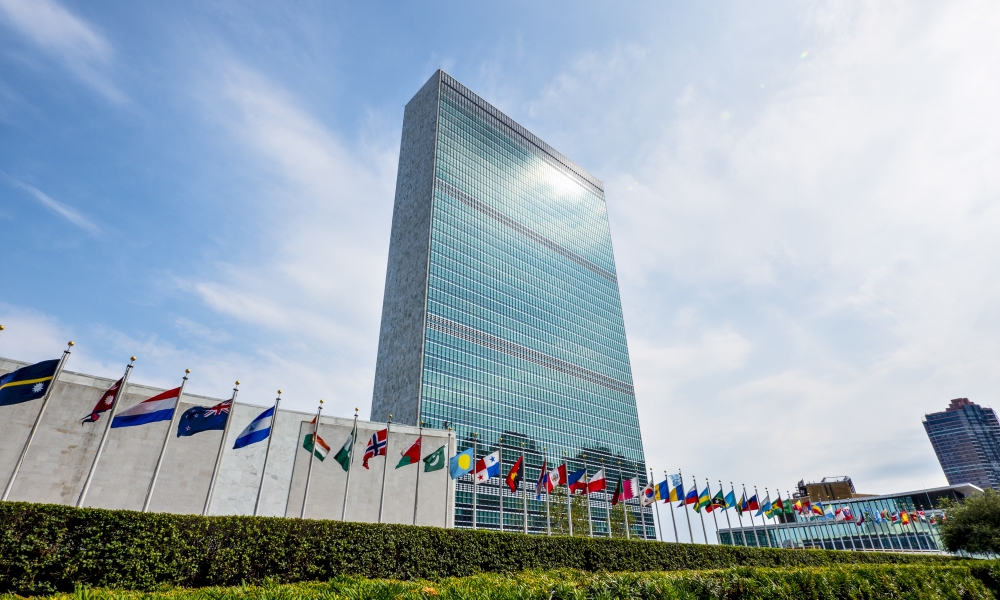
Asks for the HLM4 Political Declaration
As governments finalise the Political Declaration (PD) of the HLM4, World Obesity is urging members, partners and allies to help strengthen language in three areas, to reflect:
- The full scale of the obesity epidemic, with over 1 billion people affected
- The definition of obesity as a chronic complex multifactorial disease that is also a driver of multiple other NCDs
- Existing commitments to implement the WHO obesity recommendations, which include integrating obesity in primary health care
Related News
View all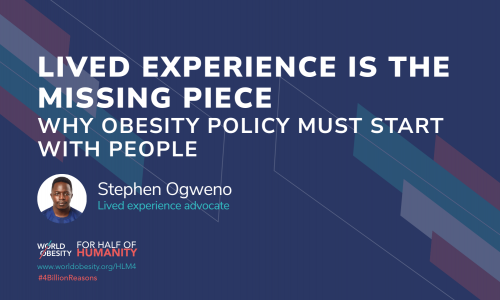
News Blog Aug 13, 25
“Lived experience is the missing piece” - Why obesity policy must start with people
For half of humanity: Stephen Ogweno explains why obesity policy must start with lived experience to drive real change.
Read Post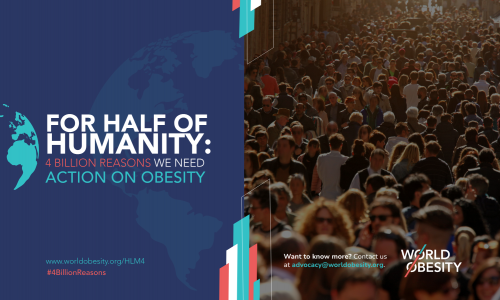
Aug 01, 25
For Half of Humanity: Four billion reasons we need action on obesity
Obesity affects over 1 billion people and will impact 4 billion people - half of humanity - by 2035 if we fail to act.
Read Post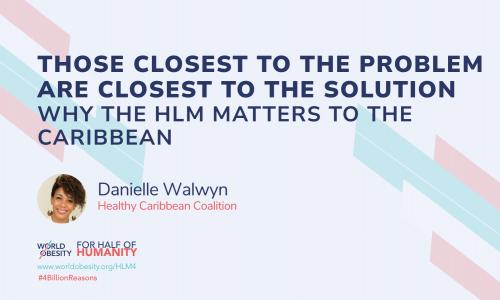
News Blog Aug 19, 25
“Those closest to the problem are closest to the solution” - Why the HLM matters to the Caribbean
Danielle Walwyn, of the Healthy Caribbean Coalition, explains why the High-Level Meeting is a key moment to act.
Read PostContact us
Contact our team to find our more information about our campaign leading up to the High Level Meeting on NCDs.
Contact



